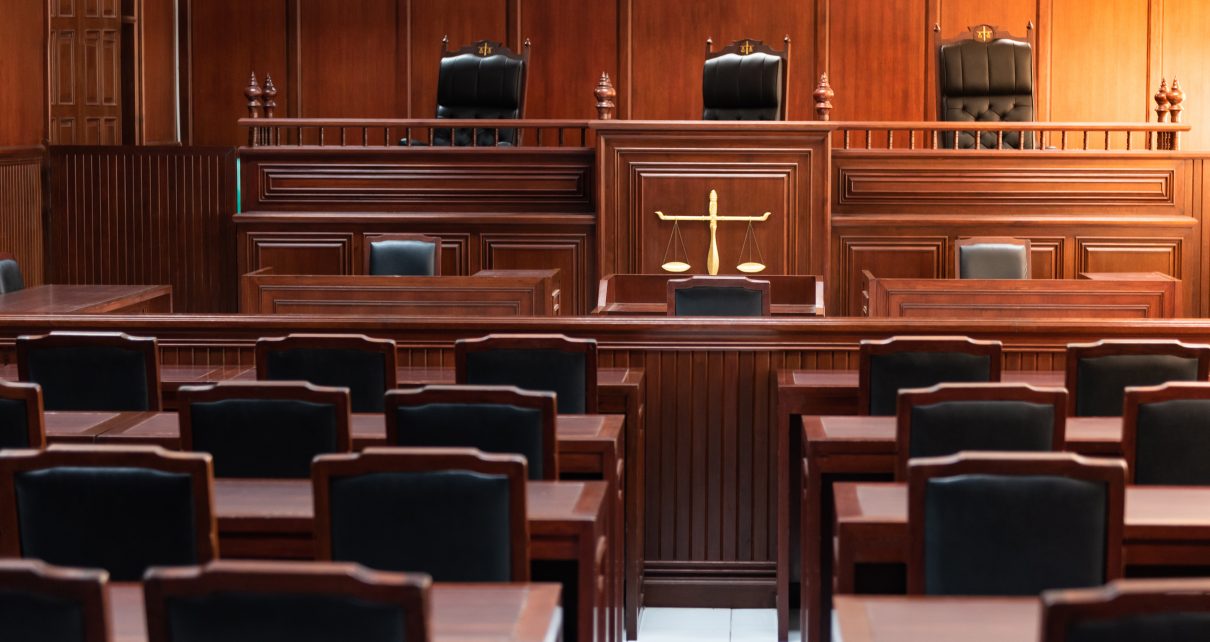
Justice Court. (Photo: Nirat.pix/Shutterstock)
Judicial Arbitration in California
Arbitration has proven to be an efficient and equitable method for resolving small civil cases
By Chris Micheli, October 3, 2024 2:30 am
California’s Code of Civil Procedure, in Part 3, Title 3, Chapter 2.5, deals with judicial arbitration. Section 1141.10 provides legislative findings and declarations that litigation involving small civil cases can be so costly and complex that efficiently resolving these civil cases is difficult, and that the resulting delays and expenses may deny parties their right to a timely resolution of minor civil disputes.
The Legislature further finds and declares that arbitration has proven to be an efficient and equitable method for resolving small civil cases, and that courts should encourage or require the use of arbitration for those actions whenever possible.
Section 1141.11 provides that, in each superior court with 18 or more judges, all nonexempt unlimited civil cases are to be submitted to arbitration under this chapter if the amount in controversy, in the opinion of the court, will not exceed $50,000 for each plaintiff.
In each superior court with fewer than 18 judges, the court may provide by local rule, when it determines that it is in the best interests of justice, that all nonexempt, unlimited civil cases be submitted to arbitration under this chapter if the amount in controversy, in the opinion of the court, will not exceed $50,000 for each plaintiff.
In each court that has adopted judicial arbitration, all limited civil cases that involve a claim for money damages against a single defendant as a result of a motor vehicle collision, except those heard in the small claims division, are to be submitted to arbitration within 120 days of the filing of the defendant’s answer to the complaint before an arbitrator selected by the court.
The court may provide by local rule for the voluntary or mandatory use of case questionnaires. The term “single defendant” is defined. The naming of one or more cross-defendants, not a plaintiff, constitutes a multiple-defendant case not subject to the provisions of this subdivision.
Section 1141.12 specifies that, in all superior courts, the Judicial Council provides by rule for a uniform system of arbitration of specified causes.
Section 1141.13 provides that this chapter does not apply to any civil action which includes a prayer for equitable relief, except that if the prayer for equitable relief is frivolous or insubstantial, this chapter applies.
Section 1141.14 requires the Judicial Council to provide by rule for practice and procedure for all actions submitted to arbitration under this chapter. The Judicial Council rules provide for and conform with the provisions of this chapter.
Section 1141.15 requires Judicial Council rules to provide exceptions for cause to arbitration. In providing for exceptions, the Judicial Council takes into consideration whether the civil action might not be amenable to arbitration.
Section 1141.16 requires the determination of the amount in controversy to be made by the court and the case referred to arbitration after all named parties have appeared or defaulted. The determination is made at a case management conference or based upon review of the written submissions of the parties, as provided in rules adopted by the Judicial Council.
The determination of the amount in controversy and whether any prayer for equitable relief is frivolous or insubstantial may not be appealable. No determination pursuant to this section is made if all parties stipulate in writing that the amount in controversy exceeds the amount specified. There are time limits regarding when the arbitration hearing is to be held and whether a case can be submitted to arbitration at an earlier time in three specified instances.
Section 1141.17 states that submission of an action to arbitration does not suspend the running of the time periods specified.
Section 1141.18 requires arbitrators to be retired judges, retired court commissioners who were licensed to practice law prior to their appointment as a commissioner, or members of the State Bar, and they sit individually. A judge may also serve as an arbitrator without compensation. People who are not attorneys may serve as arbitrators upon the stipulation of all parties.
The Judicial Council rules provide for the compensation, if any, of arbitrators. Compensation for arbitrators may not be less than $150 per case, or $150 per day, whichever is greater. A superior court may set a higher level of compensation for that court. Arbitrators may waive compensation in whole or in part.
An arbitrator is to be assigned within 30 days from the time of submission to arbitration. Any party may request the disqualification of the arbitrator selected for his or her case on the grounds and by the procedures specified in the CCP. An arbitrator must disqualify themselves upon demand of any party to the arbitration made before the conclusion of the arbitration proceedings on any of the grounds specified.
Section 1141.19 requires arbitrators approved to have the powers necessary to perform duties as prescribed by the Judicial Council.
Section 1141.19.5 states that, in any arbitration proceeding, no party may require the production of evidence at the arbitration, unless the court enters an order permitting pretrial discovery of that evidence.
Section 1141.20 requires an arbitration award to be final, unless a request for a de novo trial or a request for dismissal in the form required by the Judicial Council is filed within 60 days after the date the arbitrator files the award with the court. Any party may elect to have a de novo trial, by court or jury, both as to law and facts.
Section 1141.21 states that, if the judgment upon the trial de novo is not more favorable in either the amount of damages awarded or the type of relief granted for the party electing the trial de novo than the arbitration award, the court is required to order that party to pay the four specified nonrefundable costs and fees, unless the court finds in writing and upon motion that the imposition of these costs and fees would create such a substantial economic hardship as not to be in the interest of justice.
Section 1141.22 requires the Judicial Council rules to specify the grounds upon which the arbitrator or the court, or both, may correct, modify or vacate an award.
Section 1141.23 requires the arbitration award to be in writing, signed by the arbitrator and filed in the court in which the action is pending. If there is no request for a de novo trial or a request for dismissal in the form required by the Judicial Council and the award is not vacated, the award is entered in the judgment book in the amount of the award.
Section 1141.25 provides that any reference to the arbitration proceedings or arbitration award during any subsequent trial constitutes an irregularity in the proceedings of the trial.
Section 1141.26 specifies that nothing in this act prohibits an arbitration award in excess of the amount in controversy.
Section 1441.27 requires this chapter to apply to any civil action otherwise within the scope of this chapter in which a party to the action is a public agency or public entity.
Section 1141.28 requires all administrative costs of arbitration, including compensation of arbitrators, to be paid for by the court in which the arbitration costs are incurred, except as otherwise provided.
- Why Would the Legislature Request? - December 13, 2024
- A Different Type of Legislative Statement? - December 12, 2024
- Service of Summons in California Civil Actions - December 11, 2024



